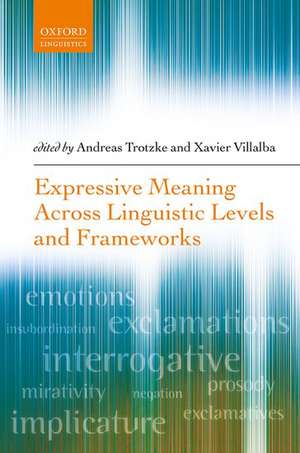Expressive Meaning Across Linguistic Levels and Frameworks
Editat de Andreas Trotzke, Xavier Villalbaen Limba Engleză Hardback – 26 aug 2021
Preț: 583.35 lei
Preț vechi: 698.92 lei
-17% Nou
Puncte Express: 875
Preț estimativ în valută:
111.62€ • 116.54$ • 92.38£
111.62€ • 116.54$ • 92.38£
Carte disponibilă
Livrare economică 03-10 martie
Preluare comenzi: 021 569.72.76
Specificații
ISBN-13: 9780198871217
ISBN-10: 019887121X
Pagini: 336
Dimensiuni: 165 x 240 x 25 mm
Greutate: 0.66 kg
Editura: OUP OXFORD
Colecția OUP Oxford
Locul publicării:Oxford, United Kingdom
ISBN-10: 019887121X
Pagini: 336
Dimensiuni: 165 x 240 x 25 mm
Greutate: 0.66 kg
Editura: OUP OXFORD
Colecția OUP Oxford
Locul publicării:Oxford, United Kingdom
Recenzii
This volume offers cutting-edge research on the structural coding of expressive meaning. The eleven chapters plus introduction convincingly show that emotion finds expression on the syntactic, morphological, and prosodic level. Different theoretical frameworks, ranging from generative to functional and usage-based, support the challenge of discovering the often subtle expressive meaning-form relations in various languages (Romance, Germanic, Japanese).
The highly synthesizing contributions in this volume are rich with insight and detail, jointly updating and re-defining the concepts of expressivity and emotion that emerged in linguistic literature twenty years ago. This impressive volume makes valuable new advances— and presents the state of the art for anyone who wants to know how linguists understand emotive language today, and what tools are available for analysis in this area.
Expressivity has been one of the hot topics in linguistics recently and this volume demonstrates the breadth and relevance of this topic by showcasing insightful and original case studies from a variety of theoretical backgrounds. The volume will be a valuable resource on the state of the art and will provide starting points for new investigations into expressivity.
The highly synthesizing contributions in this volume are rich with insight and detail, jointly updating and re-defining the concepts of expressivity and emotion that emerged in linguistic literature twenty years ago. This impressive volume makes valuable new advances— and presents the state of the art for anyone who wants to know how linguists understand emotive language today, and what tools are available for analysis in this area.
Expressivity has been one of the hot topics in linguistics recently and this volume demonstrates the breadth and relevance of this topic by showcasing insightful and original case studies from a variety of theoretical backgrounds. The volume will be a valuable resource on the state of the art and will provide starting points for new investigations into expressivity.
Notă biografică
Andreas Trotzke is Außerplanmäßiger Professor in the Department of Linguistics at the University of Konstanz. His areas of expertise include pragmatics, the syntax-pragmatics interface, psycholinguistics, and language education, and his research has been published in journals such as Journal of Pragmatics, Frontiers in Psychology, Journal of Linguistics, Linguistics, and Lingua. He is the General Editor of the journal Pedagogical Linguistics (Benjamins), the editor of numerous volumes, and the author of three monographs, of which the most recent is The Grammar of Emphasis: From Information Structure to the Expressive Dimension (de Gruyter, 2017).Xavier Villalba is Associate Professor of Catalan Linguistics and member of the Centre de Lingüística Teòrica at the Universitat Autònoma de Barcelona. His research interests include the interface between syntax and information structure, particularly right-dislocation, and between syntax and semantics/pragmatics, especially exclamative and existential sentences. His work has appeared in journals such as Discourse Processes, Journal of Pragmatics, and Lingua, and in edited volumes from Routledge, Benjamins, and de Gruyter.
